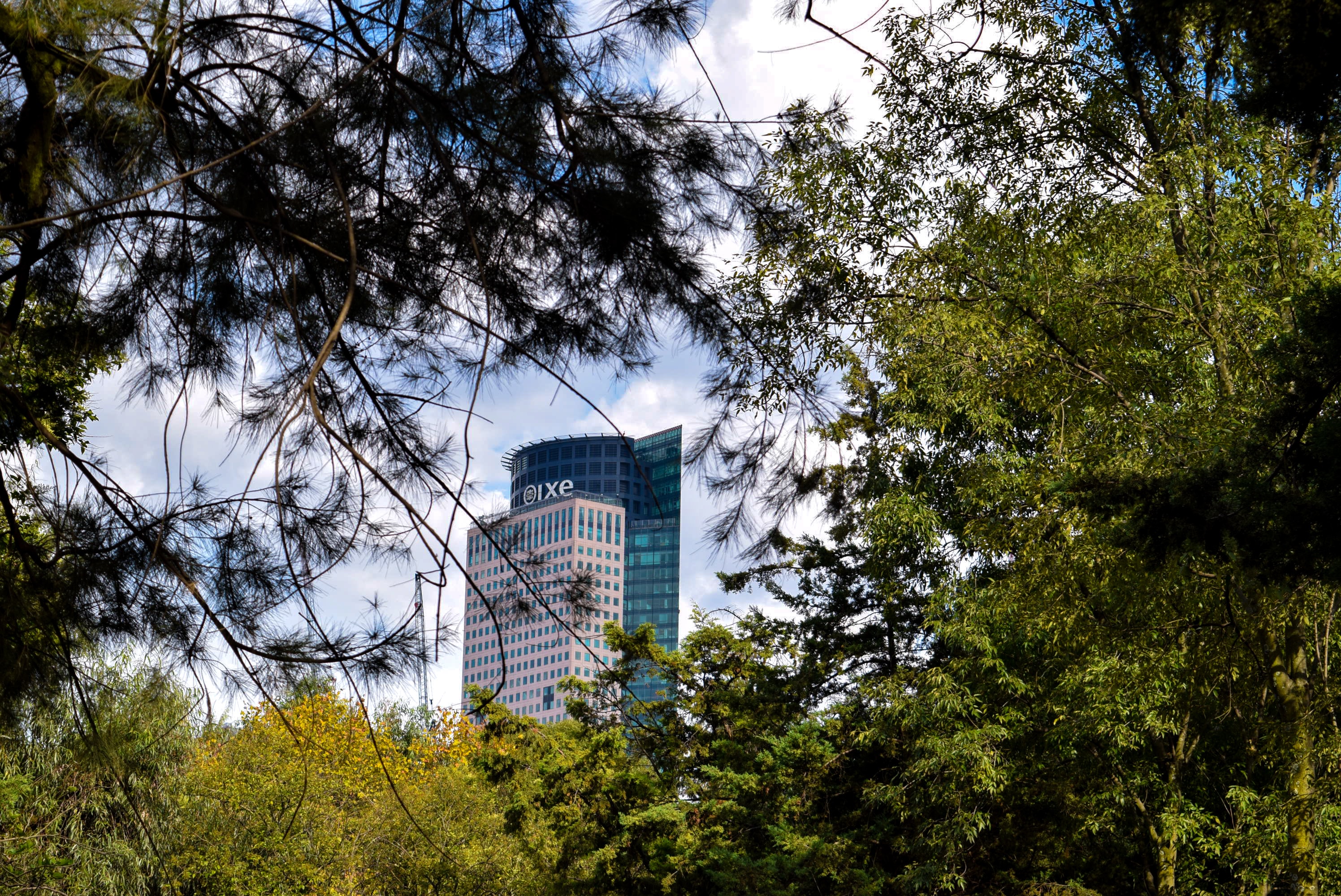Following the Corona, we were destined to face new challenges that had a great impact on the person and the environment: instead of personal meetings, we switched to meetings on Zoom and other online platforms, we traveled the country and avoided social gatherings and wore masks everywhere we went. Will 2020 also be the year that dictates the way for significant changes in the public's attitude to environmental issues?
The year 2020 will forever be remembered as the year of the Corona, during which one small virus caused the illness and death of tens of millions of citizens around the world (about 1.8 million dead and over 80 million sick), an economic crisis that may last for many years and a significant slowdown in the pace and way of modern life.
Following the Corona, we were destined to face new challenges that had a great impact on the person and the environment: instead of personal meetings, we switched to Zoom meetings and other online platforms; Instead of traveling abroad, we set out to get to know the landscape of the Land of Israel and re-evaluated the nature that is outside the home and instead of walking freely, we avoided social gatherings and wore masks everywhere we went.
Will 2020 also be the year that dictates the way for significant changes in the public's attitude to environmental issues?
January: an unusual winter system
In the first month of 2020, the corona disease was still only an unknown disease in distant China. Despite this, many Israelis locked themselves in their homes, even if for completely different reasons: An unusual winter system It resulted in record-breaking high amounts of precipitation that fell in the central and northern regions of the country. The heavy rains led to severe flooding in the streets and houses, which led to the death of Dean Shoshani and Stav Harari, a young couple in their 20s, who drowned together in a flooded elevator in south Tel Aviv, and the death of Ali Agbaria and Eran Herrnstadt, who were swept away with their vehicles in the floods.
According to experts, due to climate change and global warming, the chance of extreme weather events such as these or more severe ones occurring in Israel increases significantly. As a result of global warming, the winter in Israel will be shorter, there will be longer breaks between rainfall events, fewer rainy days and a lower overall amount of precipitation. However, each rain event is expected to be more significant, meaning a larger amount of rain will fall in a short time, which will lead to more flooding throughout Israel.

February: Plastic in milk
An experiment conducted at the University of Haifa found Microplastic particles in milk containers Made in Israel (tiny plastic particles that are released from plastic products during weathering processes such as freezing, friction, washing, exposure to the sun and more). According to the research, the origin of the particles may be from the production process of the bottles and caps: the plastic particles are apparently added to the milk during packaging or during the transportation of the milk - until it reaches the consumer. The milk joins other drinking products such as mineral water bottles and beer bottles in which microplastic particles and fibers have already been found in previous studies.
During the last decade, many particles have also been found inside the bodies of a variety of marine animals, including various types of fish and seafood that are part of the human diet. As of today, no single-disciplinary evidence has been found for significant damage to health resulting from the ingestion of microplastic particles in the amount to which humans are exposed.

March: Zoonotic viruses
The corona virus hit Israel and many countries in the world and brought with it a new reality of restrictions and prohibitions that have accompanied us in the past year: restriction of movement, ban on the operation of businesses, closure of schools and wearing of masks in public spaces. As many countries went into strict lockdowns, researchers tried From the PREDICT project The American to understand the origin of the new virus and other viruses that pass from animals to humans (zoonotic viruses) which may spread and harm public health in the future.
The scientists of the project estimate that there are about 800 zoonotic viruses in the world. As part of the study, at least 931 species of new viruses were identified, from 145 thousand samples taken in more than 60 countries.
As of today, The origin of the corona virus has not yet been found.

April: The oceans are warming
A study that examined the trend of changes in ocean temperatures in the last 32 years shows that The oceans are warming at the fastest rate in history: 4.5 times relative to the corresponding period until then. It is estimated that the oceans absorb over 90 percent of the excess heat energy that is created as a result of the greenhouse effect: as the concentration of greenhouse gases in the atmosphere increases - as a result of human activity - the more heat energy is trapped in the earth, which leads to the warming of the atmosphere and the oceans. The accelerated warming of the oceans accelerates processes such as rising sea levels, decreasing the concentration of dissolved oxygen in the water and increasing the potential for the formation of extreme weather events. This is alongside an increase in the level of acidity of the sea caused by the increase in the concentration of carbon dioxide in the atmosphere which dissolves in the sea.

May: Working from home is good for the environment
Following the corona restrictions, many workers and employers in the economy were exposed to the possibility of working from home. In fact, the Corona period was for them an experiment, forced and uncontrolled, during which they were exposed to some of the flexible working conditions of remote work (work from home only, without the operation of joint regional/neighborhood employment centers). The report "Implementation of remote work in Israel" Examined the potential of remote work in the private sector and the public sector in the Israeli economy and the expected economic, social and environmental effects of this model.
According to estimates, road congestion resulting from daily (routine) trips currently has costs to the economy estimated at approximately NIS 35 billion per year. Remote work is one of the tools to reduce the time spent daily on the roads and thus also to encourage the productivity of the economy: it is enough for only 10 percent to change their work habits part of the time to create a significant change in the congestion on the roads.
After the end of the crisis, will organizations rush to return employees to the offices? It is estimated that organizations will continue with a hybrid work model that combines remote work and work from the office on some days of the week, but not necessarily because of the congestion on the roads, but rather because of the need for efficiency.

June: Too much single-use plastic
The hygiene constraints imposed on us by the corona epidemic Increase the use of single-use plastic. The fear of contact with infected surfaces and the obligation to wear a mask led many to return to disposable products - even those who had adapted to more sustainable habits. According to the data of the Ministry of Environmental Protection, there was an increase of about 10 percent on average in the amount of household waste produced in Israel, following the Corona crisis.
In addition, the activity of the recycling plants in the world also decreased during the Corona period, mainly in the plastic industry. However, according to experts, the crisis contains an opportunity to advance the issue of recycling in Israel: the momentum of the period, in which science dictates the agenda, can be used to increase the funding of environmental projects and to change public opinion on recycling and plastics.

July: heat wave in Siberia
An unusual heat wave It hit the settlement of Verkhoyyansk located in northern Siberia and brought an all-time record temperature in the region: 38 degrees Celsius. The heat wave comes after a chain of environmental disasters that hit the region in the past year: huge fires that consumed vast natural areas whose estimated area exceeds 26 thousand square kilometers (more than the area of Israel) and a serious diesel leak, caused by the melting of the frozen ground (permafrost) on which buildings are placed and various infrastructures including the oil industry. According to experts, all events have one connecting factor: the climate crisis.

August: trees save lives
Between closures we were able to go out into the green areas and appreciate the nature around us a little more. Beyond the good feeling that the natural environment gives us, there are evidences of this that being close to nature is also beneficial for our health. Indeed, in a study conducted in Philadelphia, it was found that a significant increase in the number of trees throughout the city is expected to prevent hundreds of deaths per year. According to experts, the trees and vegetation within the city contribute to our health in several ways: they block noise, absorb air pollution and heat, provide a pleasant environment for physical activity (shade), reduce stress levels, and according to preliminary studies, it is possible that exposure to trees also improves the ability of our immune system to fight in viruses
September: Tel Aviv Cleantech index
The Tel Aviv Stock Exchange launched a new index, "TA Cleantech" which consists of shares included in the cleantech sub-branch of the technology sector and includes 12 shares with a market value of approximately NIS 37 billion. Today, 7 Cleantech shares are included in the Tel Aviv 125 index, of which 2 are included in the Tel Aviv flagship index 35. According to publications, the scope of global investments in renewable energy is on the rise: 300 billion dollars in 2019 alone, and according to estimates, the scope of electricity production based on renewable energies will continue to grow in many countries of the world. In Israel, electricity production based on renewable energy is expected to reach 30 percent of total electricity production by 2030.

October: The environmental footprint of wealth
According to a new report, The disparities between rich and poor in the world are also expressed in carbon dioxide emissions, the greenhouse gas that is released by burning fossil fuels such as coal, natural gas and oil and whose emission into the atmosphere leads to the worsening of the climate crisis. According to the report, the volume of its carbon dioxide emissions is responsible for the top islet (the one percent of the population whose income is the highest), twice as large as the amount produced by the entire poorer half of the world's population.
The report also revealed that the top decile (the 10 percent of the population whose income is the highest) is responsible for over 50 percent of all carbon emissions in the world. This group included those whose net income was higher than 38 thousand dollars per year (ie more than 128 thousand shekels per year, or about 11 thousand shekels per month on average).
According to experts, the reason for the disparity in emissions stems from "luxuries" such as multiple flights, including in private planes, ownership of multiple vehicles, heating and cooling of large houses and a higher consumption of meat.
November: Biden's climate plan

Joe Biden has been elected President of the United States and will replace Donald Trump who has been in office for the past four years. In January 2021, the new president will enter the White House, equipped with a climate plan that some say ensured his victory in the last round of elections.
throughout the election campaign, Joe Biden emphasized his commitment to the climate crisis And he promised that as his first act as president, he would return the United States to the climate agreement signed in Paris at the end of 2015 and from which Donald Trump withdrew in 2017 (a treaty that deals with reducing greenhouse gas emissions, minimizing the existing damage and financing the treatment of greenhouse gas emissions by the countries of the world). In addition, Biden presented an economic plan that promises to create hundreds of thousands of new jobs through investment in green infrastructure, sustainable development and renewable energies.
Now, all that remains is to wait for the new president of the United States to enter the White House and see if he will fulfill and implement the plans he promised.

December: decrease in emissions and increase of snails
According to the annual Global Carbon Budget report, the closures and traffic restrictions that took place during 2020 also had positive sides: a historical decrease of about 7 percent in the volume of carbon dioxide emissions. According to the report, 2020 billion tons of carbon less than in 2.4 were emitted into the atmosphere in 2019. In the 21st century, the only figure close to this extent is from 2009, when a decrease of 5000 million tons of carbon was recorded, and this against the background of the great economic crisis. The expected return to normalcy during the year 2021 with the progress of the vaccination campaigns in the world, is expected to reverse the trend and continue the annual increase in greenhouse gas emissions.
The restrictions and closures that led to the minimization of carbon emissions also brought with them a new hobby in the world: Breeding snails as pets. The trend gained momentum, especially in New York where the snail was even named "the pet of the plague". Thanks to the new trend, the snails' "screen time" on social media has increased, with the hashtag #snailmom gaining more than 10 million views on TikTok so far. Now, when the snails pop up en masse in our gardens (especially at night), maybe instead of getting rid of them, we will adopt them, under the auspices of the corona.
Despite the third lockdown, it seems that the year 2020 ends on a relatively optimistic note - the vaccines for the corona virus (SARS-CoV-2) which may contain the end of the corona crisis - but even after the storm of the epidemic, it is clear that other challenges will await us, such as an economic crisis and the global climate crisis, which Unfortunately, the way to solve them will not be so simple and fast.
the post Summary of 2020 in the environment: not only Corona appeared first onangle
More of the topic in Hayadan:
